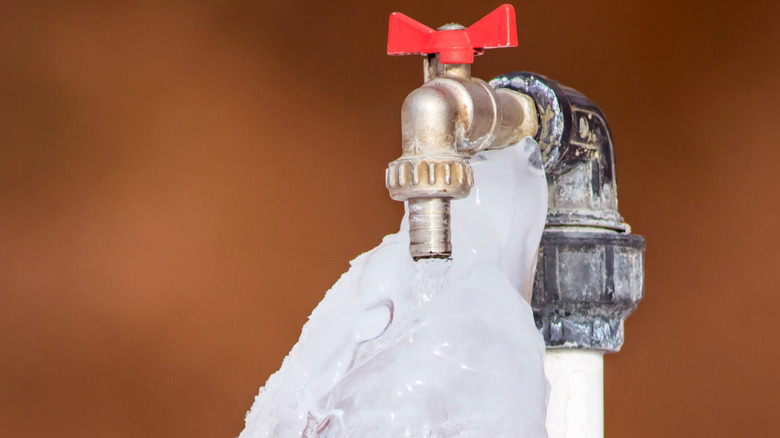Safeguarding Your Pipes from Cold Weather Issues: Critical Approaches
Safeguarding Your Pipes from Cold Weather Issues: Critical Approaches
Blog Article
The author is making a number of good annotation about Helpful Tips to Prevent Frozen Pipes this Winter overall in the article down the page.

Winter can ruin your pipes, especially by freezing pipes. Here's how to stop it from taking place and what to do if it does.
Intro
As temperatures drop, the threat of icy pipelines rises, possibly bring about pricey repair services and water damage. Recognizing just how to avoid frozen pipes is crucial for property owners in cold environments.
Comprehending Frozen Pipelines
What causes pipelines to ice up?
Pipes ice up when exposed to temperature levels below 32 ° F (0 ° C) for expanded periods. As water inside the pipes ices up, it expands, taxing the pipeline wall surfaces and possibly causing them to burst.
Threats and problems
Icy pipes can cause water supply interruptions, residential or commercial property damage, and costly fixings. Ruptured pipes can flood homes and cause comprehensive structural damage.
Indications of Frozen Water Lines
Determining frozen pipelines early can avoid them from rupturing.
Exactly how to identify frozen pipelines
Seek lowered water circulation from faucets, unusual smells or sounds from pipes, and visible frost on revealed pipelines.
Prevention Tips
Insulating at risk pipes
Wrap pipelines in insulation sleeves or utilize heat tape to shield them from freezing temperatures. Focus on pipelines in unheated or outside areas of the home.
Home heating methods
Keep indoor spaces adequately warmed, especially locations with plumbing. Open up cabinet doors to permit warm air to distribute around pipes under sinks.
Shielding Exterior Plumbing
Yard hose pipes and exterior faucets
Detach and drain pipes garden pipes before winter season. Mount frost-proof spigots or cover exterior faucets with protected caps.
What to Do If Your Pipelines Freeze
Immediate activities to take
If you think frozen pipes, maintain faucets open to soothe pressure as the ice thaws. Use a hairdryer or towels taken in warm water to thaw pipelines slowly.
Long-Term Solutions
Architectural adjustments
Take into consideration rerouting pipelines far from outside wall surfaces or unheated locations. Include added insulation to attic rooms, cellars, and crawl spaces.
Upgrading insulation
Invest in top quality insulation for pipelines, attic rooms, and walls. Correct insulation assists maintain regular temperatures and minimizes the threat of icy pipes.
Conclusion
Stopping icy pipelines calls for aggressive actions and fast feedbacks. By understanding the causes, signs, and safety nets, home owners can shield their pipes throughout cold weather.
Helpful Tips to Prevent Frozen Pipes this Winter
UNDERSTANDING THE BASICS: WHY PIPES FREEZE AND WHY IT’S A PROBLEM
Water freezing inside pipes is common during the winter months, but understanding why pipes freeze, and the potential problems it can cause is crucial in preventing such incidents. This section will delve into the basics of why pipes freeze and the associated problems that may arise.
THE SCIENCE BEHIND FROZEN PIPES
When water reaches freezing temperatures, it undergoes a physical transformation and solidifies into ice. This expansion of water as it freezes is the primary reason pipes can burst. As the water inside the pipe freezes, it expands, creating immense pressure on the walls. If the pressure becomes too great, the pipe can crack or rupture, leading to leaks and water damage.
FACTORS THAT CONTRIBUTE TO PIPE FREEZING
Low Temperatures: Extremely cold weather, especially below freezing, increases the risk of pipes freezing. Uninsulated or Poorly Insulated Pipes: Pipes located in unheated areas, such as basements, crawl spaces, or attics, are more prone to freezing. Insufficient insulation or lack of insulation altogether exacerbates the problem. Exterior Wall Exposure: Pipes running along exterior walls are susceptible to freezing as they encounter colder temperatures outside. Lack of Heating or Temperature Regulation: Inadequate heating or inconsistent temperature control in your home can contribute to frozen pipes. PROBLEMS CAUSED BY FROZEN PIPES
- Pipe Bursting: As mentioned earlier, the expansion of water as it freezes can cause pipes to burst, resulting in significant water damage.
- Water Damage: When pipes burst, it can lead to flooding and water damage to your property, including walls, ceilings, flooring, and personal belongings.
- Structural Damage: Prolonged exposure to water from burst pipes can compromise the structural integrity of your home, leading to costly repairs.
- Mold and Mildew Growth: Excess moisture from water damage can create a favorable environment for mold and mildew growth, posing health risks to occupants.
- Disrupted Water Supply: Frozen pipes can also result in a complete or partial loss of water supply until the issue is resolved.
WHY CERTAIN PIPES ARE MORE PRONE TO FREEZING
- Location: Pipes located in unheated or poorly insulated areas, such as basements, crawl spaces, attics, or exterior walls, are at higher risk of freezing.
- Exterior Pipes: Outdoor pipes, such as those used for irrigation or exposed plumbing, are particularly vulnerable to freezing as they are directly exposed to the elements.
- Supply Lines: Pipes that carry water from the main water supply into your home, including the main water line, are critical to protect as freezing in these lines can affect your entire plumbing system.
- Underground Pipes: Pipes buried underground, such as those connected to sprinkler systems or outdoor faucets, can be susceptible to freezing if not properly insulated.
https://busybusy.com/blog/helpful-tips-to-prevent-frozen-pipes-this-winter/

Do you enjoy reading about Helpful Tips to Prevent Frozen Pipes this Winter? Create a remark below. We would be delighted to see your suggestions about this entry. In hopes that you visit us again before long. Are you aware of somebody who is very much interested in the niche? Please feel free to share it. Thanks a lot for being here. Please come by our website back soon.
Schedule Service Now Report this page